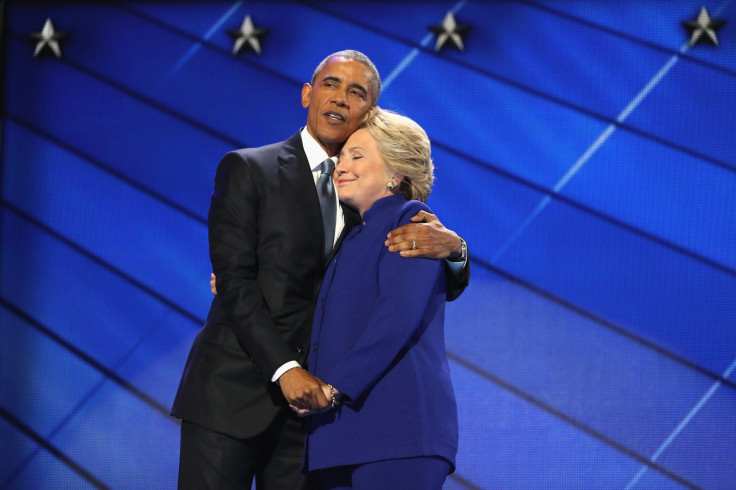How Is Hillary Clinton Different From Barack Obama? 3 Major Policies Separate The President And Democratic Nominee

President Barack Obama may be Hillary Clinton's biggest weapon on the campaign trail, but his support should not suggest that they agree on everything.
Clinton and Obama's relationship has had its ups and downs. They locked horns in a bitter presidential primary contest in 2008 that, while tame by this current election's standards of insults and jabs, featured its fair share of bad blood. But the pair resolved their differences and, after taking office in 2009, Obama named Clinton his first secretary of state, a position she held until 2012. Now Obama is one of Clinton's biggest champions on the campaign trail, giving his endorsement and anointing her the protector of his legacy.
"My name may not be on the ballot, but our progress is on the ballot," Obama said during a speech at the Congressional Black Caucus Foundation dinner in September. "Tolerance is on the ballot. Democracy is on the ballot. Justice is on the ballot. Good schools are on the ballot. Ending mass incarceration — that's on the ballot right now! And there is one candidate who will advance those things. And there’s another candidate whose defining principle, the central theme of his candidacy is opposition to all that we've done."
Obama may be firmly in Clinton's corner, but the president and Democratic nominee still differ on some key areas of policy. Here are three places where the two do not see eye to eye:
The Trans-Pacific Partnership
The Trans-Pacific Partnership has been one of the most hotly debated issues of the 2016 election. The controversial trade agreement, which concerns a group of 12 countries bordering the Pacific Ocean, aims to reduce barriers to trade, including the elimination of certain tariffs, among the participating countries as well as set standards for the ways the countries deal with each other economically. It includes stricter labor and environmental rules, legal protections for drug companies and increased copyright protection.
The agreement was published for the public in November 2015 after negotiations came to a close one month earlier, but trade deals are not politically popular right now. The 2016 election cycle has been heavily charged by the dissatisfaction of working class Americans. GOP nominee Donald Trump, on the right, and Vermont Sen. Bernie Sanders, on the left, channeled that dissatisfaction over the course of the primary races by blaming trade deals for contributing to companies' opting to outsource jobs, especially manufacturing jobs, to other countries. As a result, trade deals have developed a stigma over the last year and the TPP has fallen victim.
While serving as secretary of state, as the TPP was still being negotiated, Clinton said the agreement would "set the gold standard for trade deals." But in October, during a debate with Sanders, Clinton reversed her position and said the finished deal did not meet her standards.
"I did say, when I was secretary of state, three years ago, that I hoped it would be the gold standard," Clinton said at the time. "It was just finally negotiated last week, and in looking at it, it didn't meet my standards. My standards for more new, good jobs for Americans, for raising wages for Americans. And I want to make sure that I can look into the eyes of any middle-class American and say, 'This will help raise your wages.' And I concluded I could not."
Obama, on the other hand, still hopes to get Congress to sign off on the trade deal.
"Right now, I’m president and I’m for it, and I think I’ve got the better argument," Obama said in August. "We are part of a global economy. We are not reversing that. It can not be reversed."
Syria
Clinton says that, as president, she would help implement a no-fly zone over Syria to protect civilians from military strikes. The country's civil war, stemming from a rebellion against Syrian President Bashar Assad's rule, has entered its sixth year, leaving thousands dead and sparking a massive refugee crisis.
But Clinton's plan is a departure from top U.S. officials, including Obama, who would prefer to focus on persuading Assad to step down. They say a no-fly zone would put the U.S. directly in conflict with Russia, which is currently working with the Syrian government to eliminate the Islamic State group and other terrorist and rebel groups in the country.
A no-fly zone could lead Russia to shoot down U.S. planes, Director of National Intelligence James Clapper said Tuesday.
"I wouldn’t put it past them to shoot down an American aircraft if they felt that was threatening to their forces on the ground," Clapper said at the Council of Foreign Relations. "The system they have there is very advanced, very capable, and I don’t think they’d do it – deploy it – if they didn’t have some intention to use it."
Obamacare
Obama touts the Affordable Care Act as one of the cornerstones of his legacy, but rising healthcare costs have made the law politically unpopular. Even Clinton, who acknowledges that the 20 million new people that have health insurance as a result of the law is a major positive, has said there are parts of Obamacare she would change. Although, she, unlike Donald Trump, does not wish to see the law fully repealed.
"Premiums have gotten too high, copays, deductibles, prescription drug costs and I have laid out a series of actions that we can take to try to get those costs down," Clinton said at the second presidential debate. "Let's fix what's broken about it, but let’s not throw it away and give it back to the insurance companies. That's not going to work."
© Copyright IBTimes 2024. All rights reserved.






















